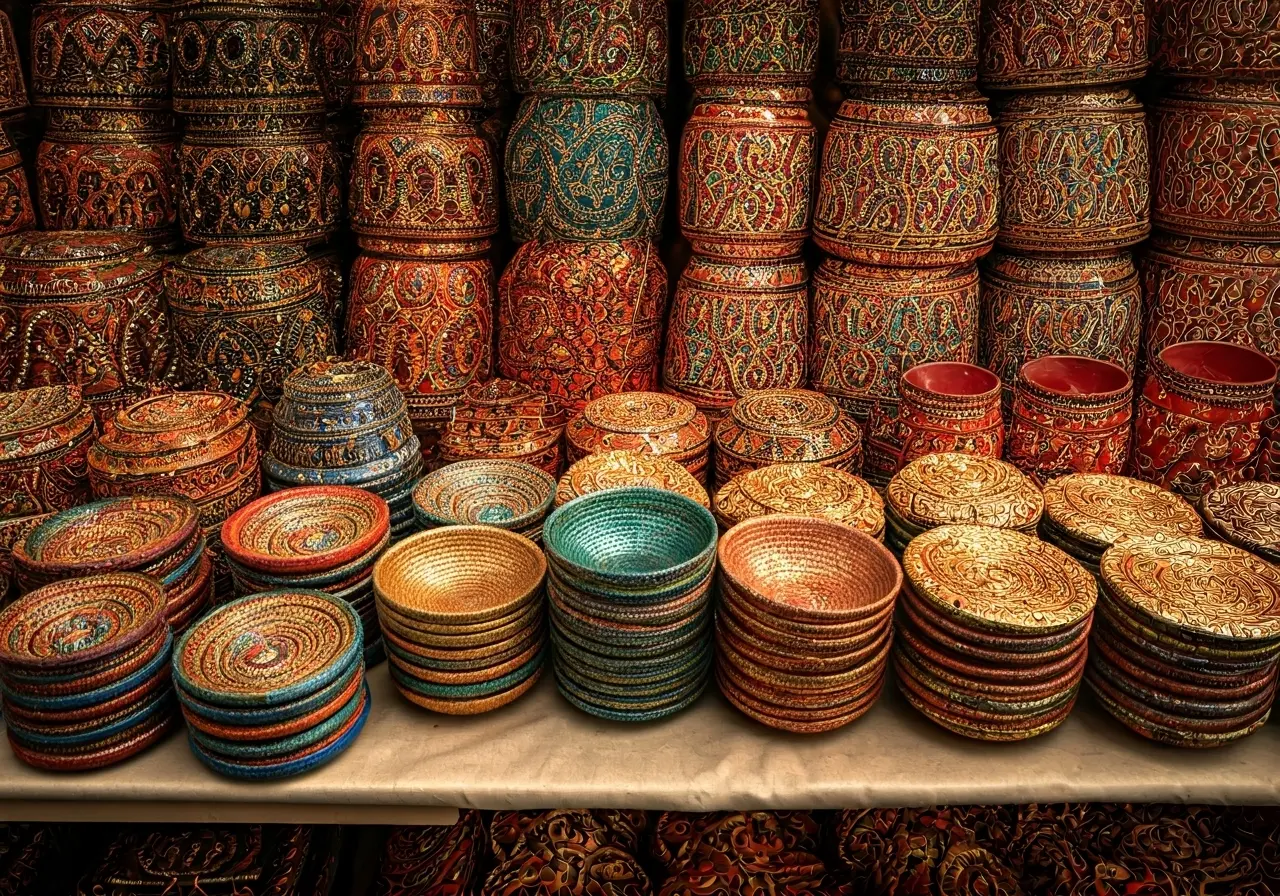In a world of mass production and factory-made goods, handmade gifts carry a unique charm, especially when they come from the vibrant and diverse country of India. Each piece tells a story, imbued with tradition, skill, and a personal touch. In this blog, we’ll explore why handmade gift ideas from India are among the best presents you can give.
1. Rich Cultural Heritage
Indian handmade gifts are steeped in cultural heritage. From intricate embroidery to vibrant pottery, each item reflects centuries of tradition. A walk through the vibrant lanes of Jaipur or the artisanal corners of Gujarat instantly transports you into a living museum of heritage crafts. The patterns and colors embody stories from various eras, allowing the recipient of the gift to appreciate and become part of this endless narrative.
Consider the beloved Kashmiri carpets, each thread meticulously woven, telling tales of Mughal emperors and ancient traditions. These are not just rugs, they are chapters of history etched into fabric, and owning a piece means having a tactile link to India’s storied past. This embedded richness makes handmade gifts from India an esteemed choice for those who value depth and meaning in their presents.
2. Exceptional Craftsmanship
Indian artisans are known for their extraordinary skills. Their attention to detail and precision turn ordinary materials into extraordinary works of art. In regions like Rajasthan, artisans create stunning block printed fabrics, where each block is carved by hand before being used to transfer unique designs onto cloth. This craft, which dates back centuries, is a testament to the skill and patience of the artisans.
Likewise, the meticulous work found in filigree jewelry—a delicate kind of metalwork where twists and layers create intricate designs—exemplifies a dedication to excellence. Each piece is the result of countless hours of skilled handiwork, which cannot be replicated by machines, making every item a one-of-a-kind treasure that stands the test of time.
3. Unique and Personalized
Handmade gifts can often be customized, making them truly unique. Unlike mass-produced items, no two handmade gifts are exactly the same, allowing for a personal connection between the giver and the recipient. For instance, the art of embroidery can be tailored with specific colors or patterns that the recipient cherishes, making them feel special. This personal touch transforms a mere object into a heartfelt keepsake.
4. Eco-Friendly Materials
Many handmade gifts from India are crafted using sustainable and eco-friendly materials, promoting environmental conservation. Artisans utilize locally sourced, renewable resources such as bamboo, jute, and recycled glass. The use of upcycled materials not only reduces waste but also enhances the creativity of the craftsmen, who transform discarded items into wonderful new creations.
5. Support for Local Artisans
Purchasing handmade gifts supports local artists and craftsmen, helping to sustain their livelihoods and keep traditional crafts alive. This economic support can be pivotal for communities, empowering artisans to continue their craft and pass down skills to future generations. When you buy a handcrafted piece, you contribute to an economy that values quality, creativity, and cultural importance over sheer profit.
6. Connection to Traditions
These gifts often embody traditional techniques and designs passed down through generations, keeping ancient traditions alive. Embark on a journey through India’s diverse regions, where each craft tells a tale of ancestral wisdom transferred through hands and hearts across ages. Whether it’s the complex weaving practices of Varanasi or age-old talavera pottery techniques, these crafts connect us to a rich continuum of cultural practices.
7. Artisanal Diversity
Each region in India offers its own unique crafts, from the block prints of Rajasthan to the weaving of Kanchipuram. This diversity is not just geographical but also in styles, materials, and cultural narratives. In India’s northeast, Naga shawls are an embodiment of this artisanal diversity, each with its own motifs and meanings, representing identity and tradition.
Such variety in craftsmanship provides a broader palette for anyone seeking unique gift ideas, accommodating a wide range of tastes and preferences. For instance, the colorful Kolhapuri sandals, with their distinctive patterns and soles, cater to both to the fashion-forward and those who appreciate classic styles.
8. Customization Opportunities
Artisans often accept custom orders, allowing you to create a personalized gift that is truly special. This opportunity to personalize transforms the gifting experience, enabling you to blend personal preferences with traditional craftsmanship. Imagine having a saree made to order or a piece of jewelry designed specifically with your favorite gemstones.
9. Stories Behind Every Piece
Every handmade item has a story to tell, whether it’s about the artisan, the process, or the inspiration. Knowing the narrative adds a layer of meaning, transforming an everyday item into a treasured keepsake. The crafting story, be it the time involved, materials chosen, or the trials faced, becomes part of the gift itself, enriching the experience of both giver and receiver.
10. Vibrant Use of Colors
Indian crafts are known for their vibrant colors, adding a touch of cheer and vitality to any gift. The pigments used often come from natural sources, such as turmeric, indigo, and madder, making them not only visually stunning but also eco-friendly. These colors are not mere ornamentation; they echo cultural symbols and meanings, enhancing the depth of the gift.
11. Timeless Appeal
Handmade items often have a timeless quality, cherished for their beauty and craftsmanship over the years. Unlike trends that come and go, these pieces offer an enduring elegance that stands the test of time. Whether it’s a classic Phulkari shawl or intricately carved wooden pieces, they offer values of durability and timeless beauty.
12. Ethical Gift Giving
Purchasing from ethical sources ensures fair trade practices are supported, honoring the effort and time of artisans. This results in a more equitable transaction where artisans receive a fair price for their skills, which often go unrecognised in a mass-produced market. Ethical gifting through handmade options complements the intention behind the present, creating a gift with both meaning and respect.
13. Versatility in Options
From jewelry to home decor, the variety of handmade gifts available is vast, catering to all preferences and tastes. No matter the occasion—be it weddings, birthdays, or anniversaries—you can find a handcrafted piece that resonates with the recipient’s interests and style. This versatility means there’s always a perfect handmade gift for every personality and preference, ensuring a thoughtful choice each time.
14. Inspiration from Nature
Indian crafts often draw inspiration from nature, incorporating motifs and materials that reflect the country’s rich biodiversity. The organic patterns and natural elements are not only aesthetically pleasing but also imbue the crafts with a sense of place and belonging. This connection to nature provides an authenticity to the gifts, offering a slice of India’s natural beauty alongside cultural artistry.
15. Sustainable Gifting Choice
Choosing handmade gifts supports sustainable practices, emphasizing quality over quantity and fostering thoughtful consumption. These gifts usually promote environmentally friendly production methods, aligning with the growing global emphasis on sustainability. In favoring handmade over factory-made, consumers can contribute to this green movement, making sustainability part of the joy in gifting.


